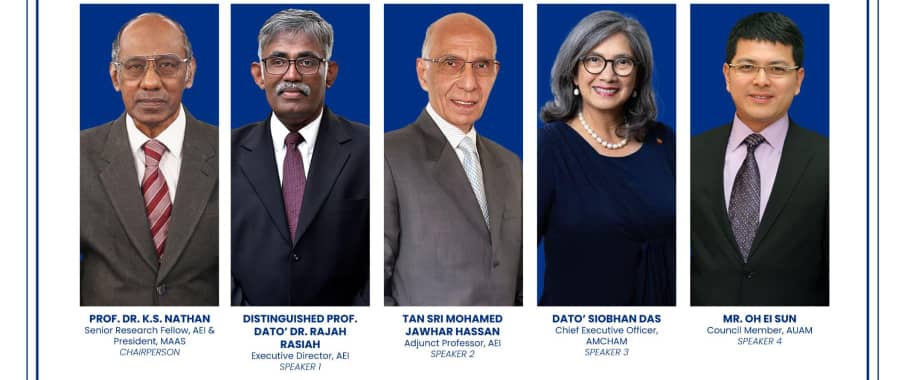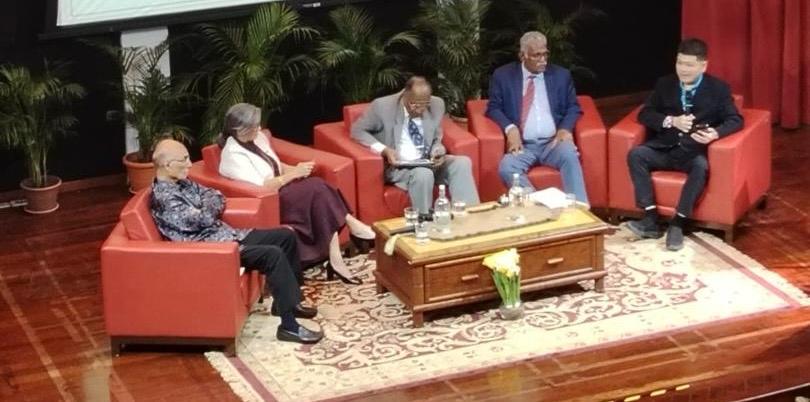Forum explores impact of a potential second Trump Presidency on U.S.-Malaysia Relations and the Indo-Pacific
KUALA LUMPUR – Experts and policymakers gathered at the Asia-Europe Institute (AEI), Universiti Malaya, on Friday for a thought-provoking forum examining the potential impact of a second term under former U.S. President Donald Trump on foreign, economic, and security policies concerning Malaysia, ASEAN, and the broader Indo-Pacific region.
The event, held in collaboration with the Malaysian Association for American Studies (MAAS) and the American Universities Alumni of Malaysia (AUAM), sought to provide a nuanced analysis of the shifting geopolitical and economic landscape under a possible Trump presidency in 2024.
Titled The 2024 U.S. Presidential Election – The Second Trump Administration: Implications for U.S. Foreign, Economic, and Security Policy for Malaysia, ASEAN, and the Indo-Pacific Region, the forum featured prominent figures in international relations and economics. Distinguished Professor Dr. Rajah Rasiah, Tan Sri Mohamed Jawhar Hassan, Datuk Siobhan Das, and Mr. Oh Ei Sun shared their insights, with Prof. Dr. K.S. Nathan serving as the chairperson.

U.S.-Malaysia Trade Relations in Focus
In his keynote address, Professor Dr. Rajah unveiled findings from his co-authored analysis, “Trump’s 2024 Presidential Elections Victory: Likely Scenario for U.S.-Malaysia Trade Relations.” Dr. Rasiah highlighted how Malaysia’s evolving political alignments and U.S. foreign policy under Trump could reshape bilateral trade.
His analysis pointed out a slight decline in Malaysia’s exports to the U.S. in 2022, which stood at just 10.8 percent, reflecting the growing economic influence of China over Malaysia’s trade dynamics.
“The trajectory of U.S.-Malaysia trade is shifting,” said Dr. Rasiah, noting that while the two nations’ economic ties have deepened since the mid-20th century, recent developments suggest that Malaysia’s future economic strategies will need to adapt to the evolving global landscape.
The Geopolitical Implications of Trump’s Policies
Tan Sri Mohamed Jawhar Hassan, a veteran of international relations, addressed the broader implications of a potential second Trump term, focusing particularly on his protectionist trade policies and tariffs on Chinese imports. Jawhar highlighted the significant challenges Malaysia could face as the U.S. seeks to strengthen its domestic economy while pressuring China.
“Malaysia must navigate the fine line between its economic interests with the U.S. and its growing ties with China,” Jawhar said, cautioning that the region’s economic future could be influenced by the U.S.’s hardline stance on China.
Strengthening Malaysia’s Position in the Global Economy
Datuk Siobhan Das, CEO of the American Chamber of Commerce in Malaysia (AMCHAM), shared insights on how Malaysian businesses could leverage their competitive advantages in response to the evolving trade environment. Highlighting the opportunities within Malaysia’s technology-driven sectors, she emphasized the importance of agility in adapting to both U.S. trade policies and the broader regional economic shifts.
“Malaysia’s success will depend on how well it can diversify its partnerships and maintain a competitive edge in high-growth industries,” said Das.
Trump Administration, Regional Stability and ASEAN’s Role
Mr. Oh Ei Sun provided a geopolitical perspective, examining how a second Trump administration could affect regional stability and ASEAN’s strategic positioning. He pointed out that ASEAN nations would need to bolster multilateral cooperation to mitigate risks posed by the U.S. pivot away from traditional alliances.
“ASEAN must adapt by enhancing its economic resilience and political cohesion to face potential uncertainties brought about by U.S. foreign policy shifts,” Oh noted.
Looking Forward: A Call for Strategic Engagement

The forum concluded with a consensus that Malaysia and ASEAN must remain adaptable in the face of potential policy shifts under a second Trump term. Participants emphasized the need for Malaysia to strengthen its bilateral ties with the United States while simultaneously diversifying its global economic relationships.
As the world watches the lead-up to the 2024 U.S. Presidential Election, this timely forum underscored the complexities Malaysia faces as it seeks to maintain its strategic position in the rapidly evolving Indo-Pacific region. – NMH

Facebook Comments